Reply To:
Name - Reply Comment
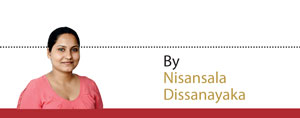
If plans to legalize prostitution become a reality, Sri Lanka would be the first South Asian country to do so. The legal background is being formed with the support of international bodies. Many people view legalization of this shadowy, denigrated profession as a necessity. We held an opinion survey on the pros and cons of legalizing prostitution in Sri Lanka.
Old Market
Maheshwari, Co-president of the Center for Sex Worker’s Rights (CSWR) says sex workers are just suppliers for a centuries -old market. ‘‘They are facing social, physical and mental violence as society brands their profession as immoral.
“Though sex work runs elaborately among the higher classes, lower class sex workers are ill-treated. The upper class workers live luxurious lives with huge earnings and protection from police and politics.
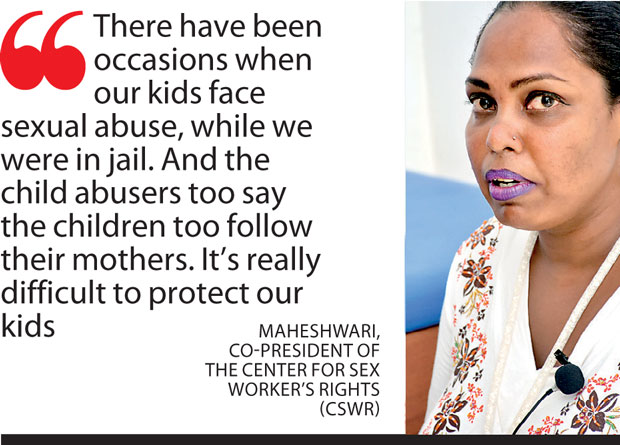
“Police raid sex workers often, impose fines of around Rs. 100 but keep them in jail for months. During the stay in jail, they are abused by the Policemen, too. The Police arrest sex workers after making use of their services. Sometimes, the Police arrest our (CSWR) members, while we are providing birth control facilities to professionals, for their own protection. Is that the duty expected from the Police?” she asked point blank.
“We are working at a profession as other people do. We are human, we have children, and we are mothers. We have hopes for our children as other mothers do in this society. But we are treated like trash. Our kids are neglected in school and society. Even when we are accompanying children to school, we have to face frequent questioning by the Police - whether we use kids to engage in the same profession.
“There have been occasions when our kids faced sexual abuse, while we were in jail. And the child abusers too say the children too follow their mothers. It’s really difficult to protect our kids, ” Maheshwari said highlighting one of the problems faced by sex workers.
Talking about the hardships faced by sex workers, she described that Negombo and Galle have serious issues such as STDs (Sexually Transmitted Diseases), especially HIV. There are around 800 sex workers in Negombo, mostly young girls employed in garment factories, who never speak out about their hardships. There are a lot of sex workers in Anuradhapura as well. It is said that most of the sex workers are found in Negombo, Galle and Fort.
What Maheshwari wants above all is social acceptance.
No Rights
“They are not enjoying basic human rights. Prostitution is not a crime, but people consider it a crime and unethical because all the time it is attached with social stigma. Men obviously patronize it. If prostitution is legalized, prostitutes will become known and visiting them will decrease as everyone will know so and so. At least they will be open to good health care practices.
“There is ‘Brothels Ordinance and Vagrants Ordinance in which managing of brothels is a punishable offence. If women are loitering on the road, if they appear to be seducing and showing signs of prostitution, the Police can arrest them, but their interpretation could vary.
“Now, the arresting has become habitual for Police and sex workers as well.
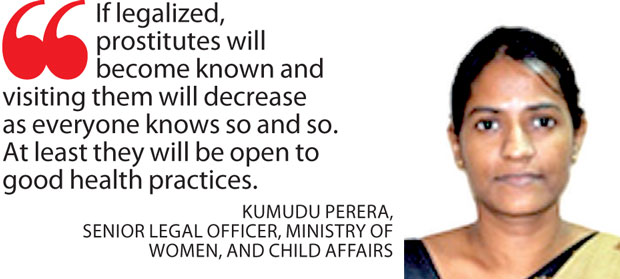
“What happened in the past, as to my knowledge, is that the arrested and punished sex workers are sent to Methsevana a rehabilitation center located close to the University of Sri Jayawardhanapura. I have no idea of what is happening to the arrested sex workers now.
“If the arrested person has dependents under 18 and is the breadwinner of the family, the Police have to send those for the care and protection of the immediate family. These laws were formulated in the 1800s and the fine is as of that time. Now, we are in a process to amend the law soon. If sex workers have faced physical assault, they should seek refuge in the Penal Code.”
Not here
“Prostitution was a leading profession in ancient India. No historical evidence has been found on prostitution here. Kings and rulers hadn’t permitted it here. Prostitution is an existing social problem in this commercial society, which is connected with economics, politics and crimes. Even in India, prostitution is not legalized yet. Cambodia, Malaysia and Laos are among the few countries that had legalized it.
“If prostitution is to be legalized here in Sri Lanka, we have to take it into immediate consideration before the government approves of it. A broad discussion should take place with leading personalities in Sri Lanka as lawyers, the Buddhist clergy and socially responsible people, all together. First of all, a formal discussion should be held. Some people openly reject legalizing this. In my point of view, there should be a developed public opinion on this highly controversial issue.
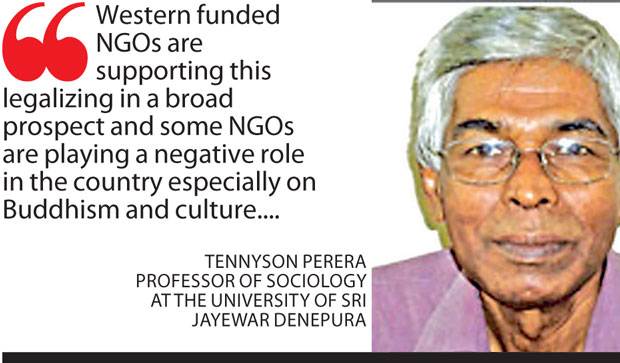
“There are some other issues related with prostitution. This has a demand-supply curve because women avoid sex during pregnancy that leads to break between the couple, but men are sexually active all through their lives. That’s one of the reasons for the demand of prostitution.
“Street prostitution is very secretive and therefore unstoppable. Poor women find this a beneficial extra livelihood, and it is difficult to break the profitable habit.
Prior to the revolution there was a prostitution issue in the Soviet Russia. They found the reason for prostitution as the night shifts. And they banned doing night shifts and the situation was successfully controlled.
As a sociologist, I am not against legalizing it, but it should exist within the context of other Asian countries. I emphasize that legal restrictions should exist, it should be presented to Parliament.
Mass media play a vital role in this either supporting or against. Social reformists are against this. But this is a timely issue. If prostitution is legalized, some limits should be imposed on it.
“Western funded NGOs are supporting this legalizing in a broad prospect and some NGOs are playing a negative role in the country especially on Buddhism and culture.”
Better control
“Legalizing is better to detect STI’s because we issue them license and it helps to detect HIV and STIs for some extent. But legalizing only cannot control spreading STI’s as there are many private sex workers. As for now, we are continuing programs for sex workers in association with NGOs to supply them free birth control, awareness on sexual health. As recorded by districts, Colombo tops the STIs list following Gampaha, Kurunegala, Kalutara and Ratnapura. There isn’t a big issue regarding health in legalizing but socially, it will be a disadvantage as many people will engage in this profession as it is legally protected, and there will be a rise in clientele as well. According to the clinical reports, 18,979 STI (Sexually Transmitted Infections) have been recorded in Sri Lanka in 2015.
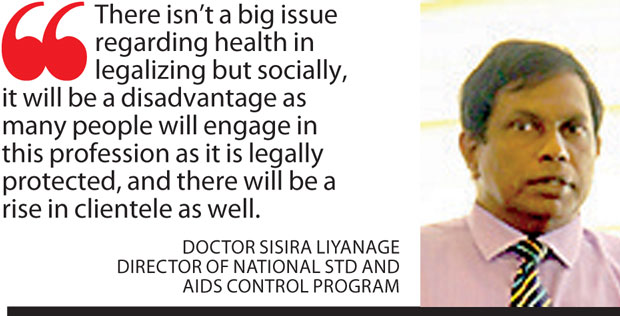
Whoredom by Robert Knox
Robert Knox describes ancient Sinhalese society and their lodging, bedding, whoredom, marriages, and children in Chapter VII as follows in his book “An Historical Relation of the Island Ceylon, in the East-Indies.”
“So that youth are bred up to Whoredom. Indeed here are no Publick Whores allowed by Authority. In the City some that have followed that Trade, have oftentimes by the King’s order been severely punished by Whipping, and having their Ears and Hair cut off. But in private few or none can exempt themselves. And for the matter of being with Child, which many of them do not desire, they very exquisitely can prevent the same.

They are guilty of the thing, but love not the name. Indeed the Publick Trade would be bad, and hardly maintain them that exercised it, the private one being so great. And tho I think they be all Whores, yet they abhor the Name of Vesou, which is Whore. Neither do they in their anger reproach one another with it, unless they should lay with a Man of an inferior quality to themselves, And the Woman reckons her self as much obliged to the Man for his Company, as he does to her for hers.”
In the past, it was not taboo to find sexual pleasure out of the family. There were traditions as polygamy and people could leave their partners if they are willing to marry or live with someone else, according to sociological observations. Even before introducing proper laws, human interactions went on smoothly in past. Our society changed after Victorian law and catholic good conduct enforced on it.
New trend
Homosexuality has become the new trend, connected with increasing HIV, especially in urban areas. We cannot accuse anyone for being different sexually and living with their choices, but these social trends in a broad sense seriously damage health and family.
Definitions for prostitution by Kingsley Davis - an American sociologist.
1 Prostitutes should provide their service to everyone who comes to them without any discrimination.
2 It is based on money and gifts.
3 No emotional or sensitive bonding with customers.
Definition for prostitution in Encyclopedia.com
“The provision of sexual favours for financial reward has probably been institutionalized in the form of prostitution in every society that has had a coinage. It has nearly always involved the prostitution of women to men, though male prostitution, especially to male clients, is not uncommon.
Kingsley Davis proposed a functional theory which saw prostitution as a safety-valve, helping maintain the respectability of marriage. Prostitution certainly flourished during the Victorian Period of rigid sexual morality. But feminists have pointed out that prostitution provides no safety-valve for women, and indeed controls them by labeling those who are not chaste as whores.
Victorian prostitution was connected with double standards in morality, which was much more permissive for men than for women. Sociological studies of prostitutes show that their motivation is mainly economic and it seems likely that the number of prostitutes increases when there are fewer other job opportunities for women.
International movements of prostitutes are nearly always from poor countries to richer ones. There are few studies of clients, though a Norwegian study found that while most of them are ‘Mr. Average’, there are a number of single men who have difficulties relating to women who go to prostitutes quite frequently.”
(http://www.encyclopedia.com/social-sciences/dictionaries-thesauruses-pictures-and-press-releases/prostitution-sociological)
WHO Report on SEX WORK IN Sri Lanka
Anecdotal evidence suggests that the size of the commercial sex market has increased in recent years. There is a market catering to local men and a sex tourist market….. Sex work sites include beaches, street prostitution, massage clinics (mainly in Colombo) different classes of brothels and ‘satellite’ brothels around guesthouses. The growth of free trade zones and the low wages paid to the women who work there propel some into sex work – often on a part time basis. There appears to have been a growth in this type of part time sex work….. Trafficking of women does occur in Sri Lanka and over one third of sex workers who took part in a pilot study revealed that they had been trafficked into the trade….”
Child Sex
Sri Lanka has become famous for child sex workers, connected with tourism. It is said that if one needs a prostitute, go to Thailand, if need child sex, go to Sri Lanka. Even the United Nations is involved in solving the child sex trade here, as we are among the top five countries engaged in child prostitution. Among the four forms of prostitution as female, male, child and homosexual, male and child sex trades have increased at a fast pace in the recent past.
LEgalizing better or bitter?
Street sex workers are completely unsafe compared to sex workers in higher society. Nowadays, emerging actresses are having close relationships with young politicians, shifting sex work into a new dimension.
“If sex work is legalized, people under 18 won’t be forced into sex work,” many people said.
There are pros and cons to legalizing prostitution in Sri Lanka. As a Buddhist country with a proud history and unique culture, many disagree legalizing it. By doing so, the public is openly encouraged to engage in prostitution.
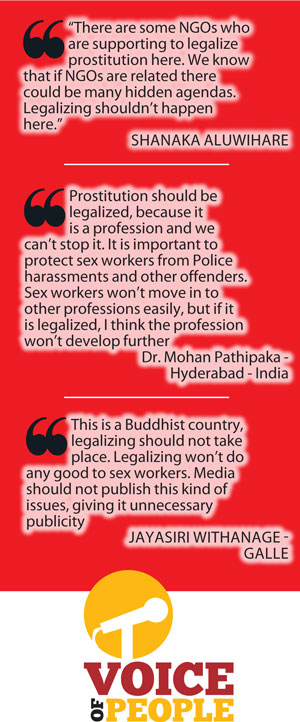
If social acceptance is offered to prostitution, many young people will join this work force for easy money as it is legally protected.
With the discussions held on the prostitution issue, many sex workers stated that they are keeping it a secret from their families, as their true livelihood is hidden from their families, relatives, neighbors and home town. Some sex workers openly expressed that if they knew what they would have to face, they would never become sex workers.
Amending
Sri Lanka still runs on outdated laws that cannot protect the innocent or punish the guilty.
Not only in this sector, but also in many other sectors. Setting fire to forests and many other crimes result in negligible fines and punishment. Some people do not like to review these laws because it would put them at a disadvantage.
Should we legalize prostitution or not?
Should we keep neglecting sex worker’s children? How can we protect the society from the ugly side of prostitution? All these and other unasked questions are waiting for a broad social discussion.